Our proposal is a sample deal you can use to help you get started with your own. We will cover the details of this sample proposal letter from top to bottom, step by step. Also included in this blog post are a few helpful notes for church media department ideas, additional sample proposals for church marketing department and other helpful resources that may be relevant to your situation.
Church has been a part of our lives, which is why we do not want to miss hearing from you, because we know that churches also embrace change and innovation. That’s why we’re here – to create awareness about the Church media department project idea and find solutions for your media department issues. As it is difficult to address specific issues with this brief communication, we would be happy if you could simply provide us with feedback and information on how to improve our proposal.
Churchgists affords you unrestricted access to a litany of valuable information on church project proposal sample pdf, church proposal ideas, church proposal for funding pdf, and related topics. Take some time to surf through our catalog for more information on similar topics.
Sample Project Proposal For Church
The church media department is a group of people who take care of all the equipment for a church. You can start with a small budget and then make it grow by increasing the number of members or starting new programs or churches. Thank you for your interest in the church media department. As part of our marketing department, we would love to provide sample proposals for churches and pastors in your area.
A proposal is an offer to do something project-oriented. At first, it may appear that writing a proposal is a simple task but in fact, it’s not because the industry you are dealing with or the complexity of your project requirements will affect the structure and organization of your proposal. You should understand every part of your proposal before submitting it, as it is important that you don’t make mistakes later on when it comes to negotiating your offer. So push through your concerns and become familiar with all the features that need to be included in your proposal, either as separate documents or combined into one document.

Is your head brimming with wonderful ideas of events that you can do for your church? Do you think that your ideas can greatly benefit your church and its fellowship? If yes, then it’s time to approach your church leaders such as your pastor or parish priest, your fellow members of the church, and even tap your sponsors to let them know your great event idea. To do that, you need to propose to them the idea by using a proposal document. Don’t know how to create a proposal? Read the article below to learn how to make one!
Write a Church Event Proposal Sample
Title: Church Event Proposal Sample: Hosting a Charity Fundraiser
Event Summary
This event proposal outlines a charity fundraiser hosted by our church to raise funds for a local homeless shelter. The event will include live music, food, games, and a silent auction.
Event Details
- Date: Saturday, May 15th, 2023
- Time: 5:00 pm – 9:00 pm
- Location: Church Fellowship Hall
- Target Audience: Church members, community members, local businesses
Event Objectives
- Raise $10,000 for the local homeless shelter
- Engage church members in a meaningful community service project
- Increase community awareness of homelessness in our city
Event Activities
- Live music performance by local band
- Food and drinks provided by church volunteers
- Games and activities for all ages
- Silent auction featuring donated items from local businesses
Marketing Plan
- Promote event through church bulletin, social media, and community flyers
- Reach out to local media for coverage and promotion
- Create event page on church website for online registration and donations
Budget
| Expense | Cost |
|---|---|
| Food and drinks | $500 |
| Entertainment | $1,000 |
| Decorations | $200 |
| Marketing materials | $300 |
| Miscellaneous expenses | $200 |
| Total | $2,200 |
List of Church Event Proposal Sample 1
1. Venue: Church hall
2. Date: Sunday, May 15th
3. Time: 10:00 AM – 2:00 PM
4. Theme: Family Fun Day
5. Activities: Games, face painting, food vendors
6. Budget: $500
7. Volunteers: 10
8. Marketing: Flyers, social media promotion
List of Church Event Proposal Sample 2
1. Venue: Outdoor church grounds
2. Date: Saturday, June 20th
3. Time: 4:00 PM – 8:00 PM
4. Theme: Summer Picnic
5. Activities: Potluck dinner, live music, lawn games
6. Budget: $700
7. Volunteers: 15
8. Marketing: Church bulletin, community bulletin boards
List of Church Event Proposal Sample 3
1. Venue: Church sanctuary
2. Date: Friday, December 4th
3. Time: 7:00 PM – 9:00 PM
4. Theme: Christmas Concert
5. Activities: Choir performance, nativity play, cookie exchange
6. Budget: $1000
7. Volunteers: 20
8. Marketing: Local radio ads, posters around town
| Item | Sample 1 | Sample 2 | Sample 3 |
|---|---|---|---|
| Venue | Church hall | Outdoor church grounds | Church sanctuary |
| Date | Sun, May 15th | Sat, June 20th | Fri, Dec 4th |
| Time | 10:00 AM – 2:00 PM | 4:00 PM – 8:00 PM | 7:00 PM – 9:00 PM |
| Theme | Family Fun Day | Summer Picnic | Christmas Concert |
| Activities | Games, face painting, food vendors | Potluck dinner, live music, lawn games | Choir performance, nativity play, cookie exchange |
| Budget | $500 | $700 | $1000 |
| Volunteers | 10 | 15 | 20 |
| Marketing | Flyers, social media promotion | Church bulletin, community bulletin boards | Local radio ads, posters around town |
Church Proposal For Funding Doc
1. Church Event Proposal Template
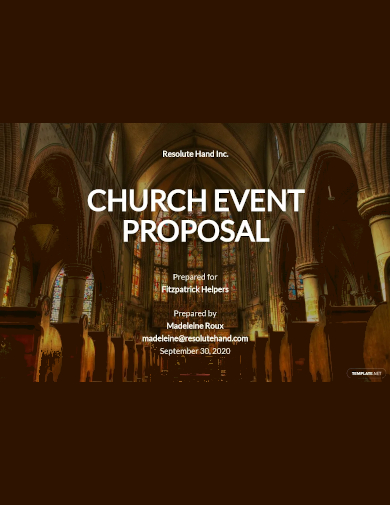
2. Church Event Project Proposal
3. Church Event Proposal
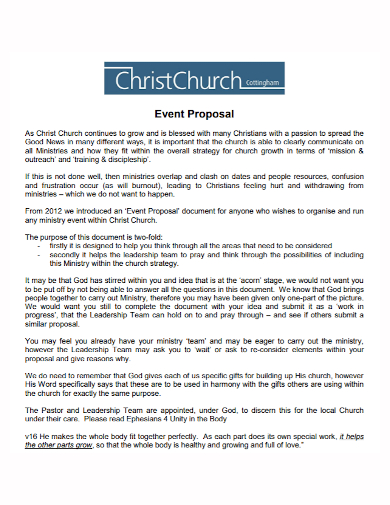
4. Church Event Proposal Form
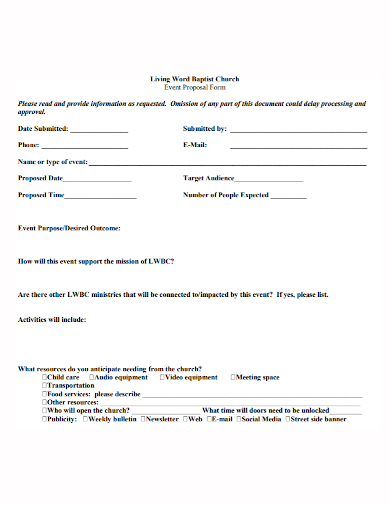
5. Church Event Request for Proposal
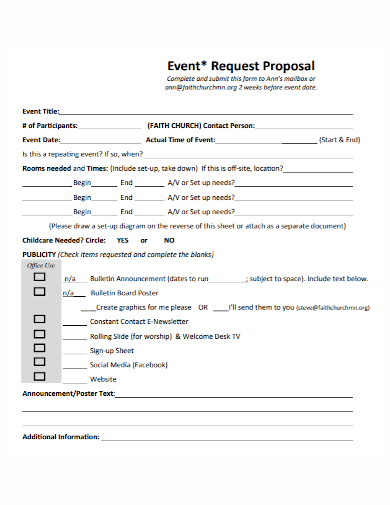
8. Church Building Event Proposal
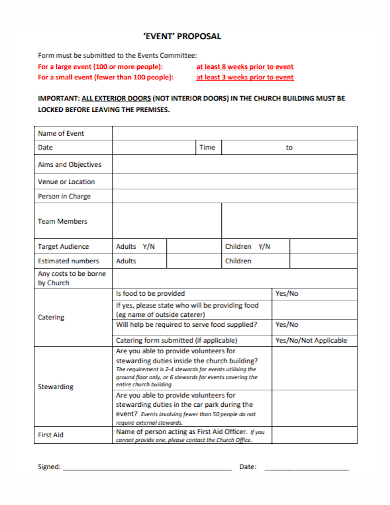
9. Church Community Event Proposal
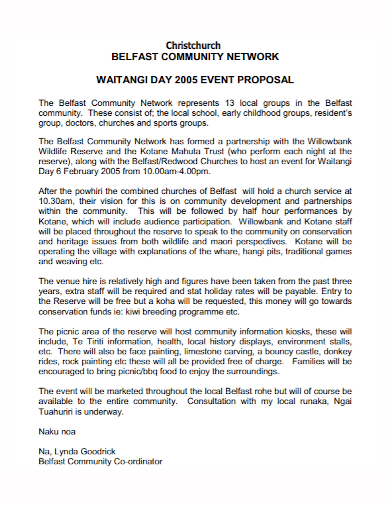
10. Church Event Course Proposal
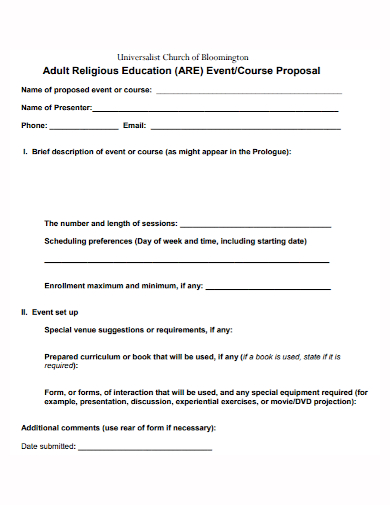
11. Church Event Sponsorship Proposal
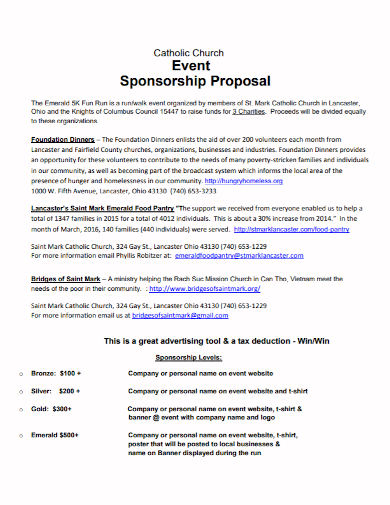
What is a Church Event?
A church event is an activity where church members gather together to do some fun and wholesome activities that strengthen their relationship with each other, meet new people, and forge a deep understanding of the Word of God to strengthen their faith. Church events can be services or workshops for the members to be more in touch with their spiritual relationship with God.
Church Proposal Ideas
These tips and tricks below can help you with some of the more difficult writing aspects of proposals. There’s also some information that can save you headaches down the road.
1. Start With an Outline
One of the best things you can do when you write anything is to create an outline. Outlines are even more important with proposals because you have a lot of stuff you’re trying to include in a complex document.
The best part is the beginning of the outline is already done for you! You can start with each of the sections we talked about above, from the cover letter to the organizational background.
Once you’ve got everything laid out, you can start filling in the blanks. This helps while you do research as well; you can put it in the appropriate part of your outline. This can help you stay organized so that your proposal is organized and clear, too!
2. Take Your Time
Don’t rush anything when it comes to writing or planning your proposal. You’ll want to dedicate plenty of time to actually writing the proposal. For most people, writing doesn’t come easily. You’ll need time and an app like Grammarly to keep you on track as you write so that you can write well.
Even when you’re done, spend a good amount of time on proofreading and editing. As a general rule, you’ll spend more time editing than you will on writing. You can use other people to read over the proposal and see how things flow. You can make changes to the structure of each section easily once it’s written.
3. Include Every Detail You Can Think of
When it comes to details in your proposal, you really can’t have too many as long as they’re in the right place. The funder wants to see that you’re going to accomplish your goal, and the more details you have, the better you can prove yourself.
4. Be as Clear as Possible
After everything we’ve discussed, it’s no secret that proposals are complex documents. They contain a ton of information, and it’s very easy to get overwhelmed by all the detailed data.
You want to prevent the funder from getting overwhelmed, and you’ll need to be thinking about that when you work through each section. One tip to help with this is being as clear and concise as you can in a main point then breaking the point down into smaller more detailed ideas underneath.
Make sure that each section of your proposal is clear by itself. Sometimes funders will go to a specific section to read, and you don’t want him or her to be confused because that section relied on previous-mentioned facts.
5. Include Everything the Grant Asks for
Sometimes the request for proposals (or RFPs) will ask you to include specific information on your proposal. This can be anything from a special timeline or even guidelines on what kinds of projects the grant will fund.
No matter what the information is, make sure to explicitly include it in the proposal. Don’t just assume that the funder will know when your proposal is within their guidelines, make sure you state it somewhere in your proposal.
Sometimes RFPs will request certain documents or information about your church in the proposal, and it’s important to have that information sent in at the same time. Even if you don’t have the information required, find a way to get it and submit your proposal with it. Without it, you don’t stand a chance.
6. Include Alternate Options and Why You’re Not Choosing Them
There’s typically never a “one answer” solution for any given problem. There are always going to be alternative solutions, and sometimes those solutions could be cheaper.
One thing to realize is that a funder wants to see these different solutions, even if you’ve ruled them out. You need to include them in your details while you explain your plan, and you want to explain why you didn’t choose that option.
This also shows your responsibility for the project. The more solutions you come up with that are potentially viable, the more you look like you’ve thought through your own solution. You’ll look more professional and serious, and it’s a way to stand out from the competition.
7. Get Help if You Need It
Don’t be afraid to get help if you need it when you’re writing your proposal. No one is an expert at writing proposals without training.
There are plenty of ways you can seek help. First, you can ask the people you care about if they have any knowledge of grant writing and would be willing to help you. This can be family members or other members of your congregation. Even people that have great writing skills and grammatical talents can help you out.
You can even hire companies or freelanceres to help you. However, you’ll want to try keeping it within your church; the more familiar the writer is with your church, the better the writing will be in general.
The biggest way you can get help is by letting those near you proofread the proposal. You’ll be able to tell how clear and how well-written your proposal is by getting feedback from someone who isn’t involved with writing the proposal itself. Sometimes this can be exactly what you need when you’re formatting your proposal.
8. Show It to People Outside of the Church
Once you’ve shown it to the people closest to you, you can branch out and show it to any acquaintances you have that aren’t part of your church.
This might sound counter-productive, but it’s a great way to see how well your proposal holds up. While church grants are typically given by groups that are led by faith, you still want your project to hold up in front of those outside of the church.
You can get valuable feedback about your executive summary this way; anyone in the community can benefit from church programs, and it’s a great way to see just how impactful your reasoning for a program can be.
How to Write a Church Event Proposal
1. Recruit Volunteers
The first thing you need to do is to gather volunteers who are willing to participate in organizing the event. They can help you work on your proposal and plan for the event. Make sure to assign each of them a task they can do to make sure they know what they will be doing and what deliverables are expected of them. Recruit volunteers through announcements during worship services, advertise in your bulletin boards or social media groups, or website, or reach to different ministry groups in your church.
2. Provide a Brief Background of the Event
This is the part where you will start writing your proposal draft. The first thing to include in the proposal is the details of the event that you’re proposing to do for your ministry. Provide some information that explains the event further and explain how the event will be beneficial to your church, especially the members. Make sure the event should be aligned with the Christian values that will be highlighted in the proposed event.
How To Write A Proposal For A Church Program
Writing a presentation proposal for an OER or Open Education conference can be a challenging task. Defined topics, specific session types, and short word limits can force writers to be both concise and creative. As someone who has successfully submitted multiple presentation proposals and served on the programming committee of a major regional OER conference, I would like to offer a few tips on effective proposal writing drawn from my experiences:
Proposals are more than simply a synopsis of your presentation topic.
A common pitfall is to spend too much of the permitted word limit describing the novelty and importance of the proposed topic. Remember that reviewers are also interested in the content of your proposed session and what the audience can learn from attending it. Make sure your proposal clearly outlines how you will address the topic, what evidence or data you will use to support your conclusions, and what knolwedge you expect your audience to gain from your event.
Look carefully at the selection criteria before you start writing
Conference reviewers follow a selection criteria when evaluating your proposal. These criteria can typically be found in the call for proposals, and they outline what contents in your proposal are being evaluated. Depending on the conference, the criteria may give preference to proposed sessions that include reflection and evaluation on the presenter’s work, contribute to scholarly research, or contain discussion on certain topics, such as diversity. Ensuring that your proposal aligns with the criteria outlined by the conference is a great way to make sure it fits with what reviewers will be looking for.
Keep your proposal focused and well organized
As you work to address the selection criteria and conference topics, be careful not to let the proposal go in too many different directions. This can confuse reviewers and lead them to think that you don’t have a well thought out presentation. While it is important to make your proposal align with the selection criteria, make sure that it is focused on your subject and coherent to read. To do this, develop several key points about your proposed session that are interrelated and connect well to your overall presentation subject. Make sure that these points are presented in a logical sequence.
Clearly define your intended audience
For example, are they people with beginner, intermediate or advanced knowledge of OER and Open Education? What type of institution or organization does your audience work at? (Ex. K-12, community colleges, research institutions) What are their roles or specializations (Ex. faculty, instruction designers, administrators). Clear definition of the audience will further demonstrate that you have a well thought out presentation.
Avoid mentioning your name, institution or organization in the proposals.
Some conferences will ask you to redact this information to shield your identity and prevent conflict of interest in reviews. Even for conferences that don’t, it’s best to avoid this since, in most cases, it does not add anything to your proposal and could introduce unnecessary biases. For example, I might say my presentation is about an OER initiative at a mid-sized public institution in the mid-Atlantic, rather than stating Clemson University.
Consider audience engagement
Be specific about what strategies and tools you will use to foster audience participation and keep them engaged throughout the event. Reviewers want to make sure that events are thought provoking, stimulate participant reflection on a subject and can sustain their interest to the end. While some session types may not allow for live engagement, having a strong plan is particularly important for longer events, such as a panel, presentation or discussion.
Proofread
Clear and polished writing is a major factor in proposal selection and also demonstrates to reviewers that you are a serious presenter. Make sure that your writing is easy to read and remove grammatical and spelling errors. Since OER conferences are designed for a wide audience, consider your wording and avoid discipline or profession specific jargon. Such jargon may confuse reviewers and make them feel that your topic is too narrow to benefit most conference attendees. You might also benefit from having someone else proofread your proposal, who can question the logic and organization of your writing and spot grammatical and other issues you have missed.
In summary, reviewers accept or decline proposals using a specific criteria. They want the conference to have the best quality presentations based on this criteria, and to make sure that the people they select are experts on OER and Open Education who have knowledge that conference participants want. Adherence to the tips that I outlined will greatly improve your proposals and demonstrate your authority on your subject.